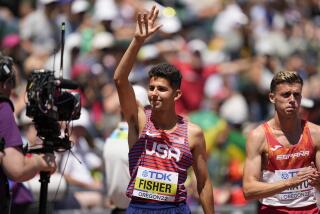No Prize Money : Top Stars Skip Boston Marathon
- Share via
BOSTON — The Boston Marathon is under siege.
Attacking the 89-year-old marathon are the elite of the running world who say tradition is nice, but it doesn’t fit in a wallet.
Defending the marathon are race organizers who declare it will never be taken hostage by money-seeking pros.
But as Boston’s field shrinks and the number of quality runners dwindle, the odds increase that America’s most famous race will take a beating in 1985.
Greg Meyer, 1983 winner of the Boston Marathon, won’t be running here this year, though he lives just 15 miles away.
“This ought to be like the Masters is to golf and Wimbledon is to tennis. But a runner only has so many marathons in him, and it’s a waste to give it away in Boston when you’ll be paid elsewhere,” said Meyer.
“A runner is only as good as the people he beats. Because Boston doesn’t attract the top people, a lot of others choose to go elsewhere.”
Toni Reavis, a Boston-based writer whose main topic is running, is bitter about what the Boston Athletic Association has done to its own race.
“This is the marathon which has the birthright to be the best. The BAA says, ‘Runners don’t make the race, the race makes the runners.’ So, now the runners, people who are running 130 to 140 miles a week, are saying, ‘Fine, we’ll go elsewhere,”’ Reavis explained.
“The BAA doesn’t want to pay the athletes, who are paid everywhere else. The Boston course is excellent, but the BAA thinks the stage is more important than the players. That’s like saying it’s not Larry Bird but the parquet floor at Boston Garden that the fans come to see.”
Tom Brown, president of the BAA, acknowledges that applications have dropped from last year’s 6,800 to less than 6,000 for the April 15 race.
“But it’s a national trend. There are just too many marathons,” he explained. “I think a lot of marathons will go down the drain. I think we’ve reached the peak nationally in the running boom and are on the way down.
“But we will still have a good field this year. There will probably be 20 men entered who have times under 2:20,” said Brown. In 1982, 77 men who had bettered 2:20 ran in Boston. Foreign entries have dropped from 550 in 1984 to 375 this year.
“I have nothing against paying prize money,” said Brown. “When it’s open and above board, that’s all right. But I do object to appearance money and expense money.”
But Meyer says his sport has moved past the stage where appearance money is necessary.
“Running is getting more legitimate and I don’t think people are looking for appearance money so much anymore. There are so many good runners out there now, it would be stupid to try and pay them all,” said the former champion.
Boston offers no prize money. The one change this year is that approximately 20 hotel rooms will be parceled out to the top runners. This comes in sharp contrast to the Chicago and New York marathons, each offering more than $250,000 in prize money.
Who’s not coming this year? It’s easier to say who is -- Geoff Smith, the 1984 winner, has the support of a local computer company and returns to defend his title. Absent will be all the rest of the world’s best, including four-time Boston winner Bill Rodgers, who also lives in suburban Boston, but is running a marathon in New Jersey which offers money.
The Boston course starts in Hopkinton and twists through a total of eight cities or towns. The overtime paid to local police is absorbed by the communities. Brown says that if the marathon pays the runners, then each community would ask to be reimbursed for all its now-free assistance.
More to Read
Go beyond the scoreboard
Get the latest on L.A.'s teams in the daily Sports Report newsletter.
You may occasionally receive promotional content from the Los Angeles Times.










